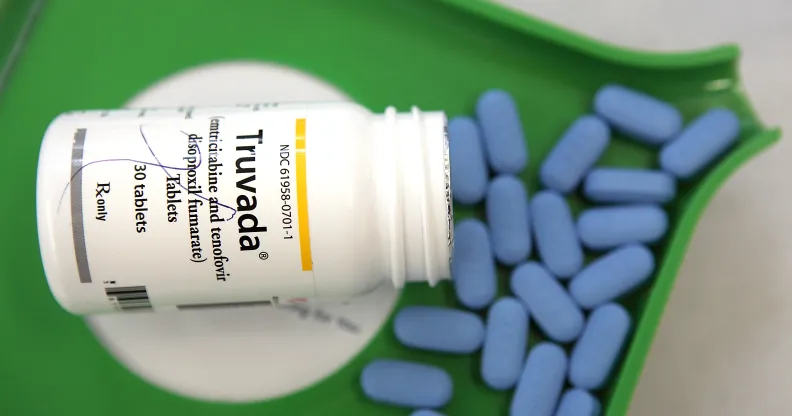New HIV diagnoses fall by a third in three years – but charities warn ‘more needs to be done’

PrEP, sometimes known by the brand name Truvada, can stop new HIV transmissions. (Getty)
New HIV diagnoses in England have fallen by almost one-third since 2015 and are at their lowest level since 2000, but experts have warned that more must be done to end transmissions entirely.
New government data by Public Health England (PHE) reveals that HIV diagnoses fell by 6 percent from 4,761 in 2017 to 4,484 in 2018.
Overall, new transmissions have fallen 28 percent from 2015, when they stood at 6,271.
The steepest decline over the three-year period was seen among men who have sex with man, with a 39 percent drop.
This reduction is even more noticeable in London, where new diagnoses among queer men have been cut in half from 1,459 in 2015 to 736 in 2018.
Fall in HIV diagnoses thanks to testing and prevention.
Dr Valerie Delpech, head of HIV surveillance at PHE, said that testing and prevention efforts are to thank for the fall in new diagnoses, including condom provision and anti-retroviral therapy (ART), the use of which means that 94 percent of people being treated for HIV in 2018 are unable transmit the virus.
She also pointed to trials of PrEP (pre-exposure prophylaxis), which can prevent people without the virus from being infected with it.
“People with HIV now benefit from effective treatments that stop the virus being passed on to sexual partners and the number of people diagnosed late is lower than ever before,” Delpech added.
Charities want PrEP to be freely available in England.
Charities have called out the government for failing to make PrEP freely available in England to help accelerate the fall in transmissions even further.
The drug is currently available to all who need it in Scotland, Wales and Ireland. NHS England is offering the drug through its PrEP Impact trial, which has been criticised for being capped – though there are 12,400 places left as of September 3.
“We urgently need to finally deliver what every UK nation except England already has,” said Kat Smithson, director of policy at National AIDS Trust.
“It would be a disaster to jeopardise the success we’ve seen today by losing focus.”
Late diagnosis remains a problem.
The issue of late diagnosis also remains a prevalent one.
Almost half of people (43 percent) who discovered they had HIV in 2018 were at an advanced stage, a number which the Terrance Higgins Trust said is “stubbornly high”.
“A late diagnosis is bad for an individual’s health and also significantly increases the chances of HIV being unwittingly passed on,” said Ian Green, the charity’s chief executive.
“Heterosexual men and those aged 50 or over remain two of the groups most affected by late diagnosis, which means more needs to be done to engage these groups around HIV testing.”
More of the same won’t cut it.
Green said that in order to meet the government’s target of ending HIV transmissions by 2030, HIV must be prioritised as a public health issue.
“‘More of the same won’t cut it,” he said.
“We need to ensure access to and awareness of HIV prevention pill PrEP, the normalisation of regular HIV testing, and to invest in sexual health services across the country to make sure they are properly funded to meet rising demand.
“We also need to get the basics right and that starts with teaching young people about HIV in schools.”
Government believes 2030 HIV target is in reach.
Public health minister Jo Churchill said that she is “delighted” by the new figures, which she believes show that the 2030 target is within reach.
“However, I am not complacent and remain dedicated to ensuring we reach our target of zero new HIV transmissions by 2030,” she added.
HIV screening is available at sexual health clinics, GP surgeries, local hospitals and certain other places.
The NHS advises that queer men have a test at least once a year, or every three months if they’re having unprotected sex with new or casual partners.
Emergency medication called post-exposure prophylaxis (PEP) may stop a person from transmitting HIV if taken within 72 hours of exposure. It is available from sexual health clinics, HIV clinics and A&E departments.

